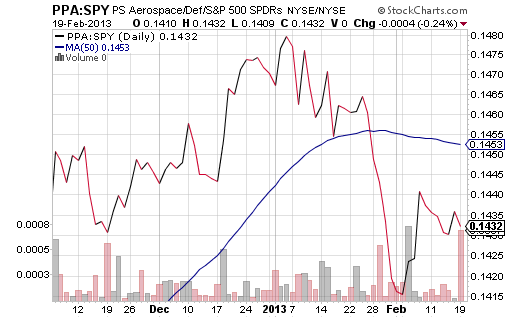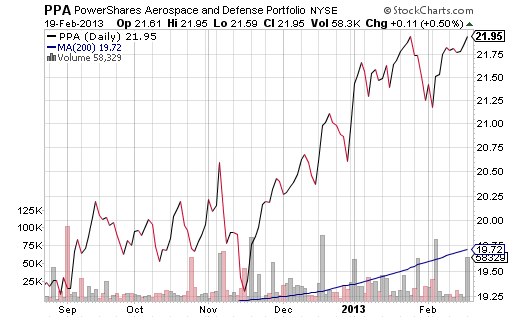The closest thing to bipartisanship in Barack Obama's presidency may have come a few weeks ago. Eight prominent Senators - four Democrats and four Republicans - have been crafting an immigration reform bill that many believe could eventually become law.
However, finding common ground on economic issues has always eluded members of Congress. The Senate hasn’t passed a budget since 2009, and with the exception of an eleventh-hour tax rate hike in the fiscal cliff conversations, nearly every major financial decision has been an exercise in delay.
Most notably, in early July of 2011, Republicans did not want to agree to raise the country’s debt limits without corresponding spending cuts. Democrats did not want to agree to spending cuts to social programs, and strongly preferred tax hikes to lower the ever-increasing public debt.
Due in large part to the partisan wrangling, U.S. stocks declined roughly 20% from their intra-year peaks. It wasn’t until August of 2011 that both sides agreed to an enforcement mechanism (a.k.a. “the sequester”) for an eventual deficit reduction package; a bipartisan bill that will pass or accept across-the-board cuts, half of which will be in the arena of “non-essential” defense spending.
Deadline after deadline passed without consequence. Even the January 2, 2013 date for sequestration had been pushed back to March 1. And as far as anyone can tell, there has been no bipartisan bill for cutting $1.2 trillion from the deficit.
It follows that scores of market-watchers, analysts and economists expect the two parties to let the automatic cuts go into effect. Specifically, the government will cut $600 billion from defense and another $600 billion from other government “faves.” (Note: Major social programs like Social Security are not part of the equation.)
The naturally resulting curious questions are: (1) Will leaders come up with another eleventh-hour postponement? (2) Will the stock market tumble if they don’t? (3) Are defense sector stocks particularly vulnerable?
I am neither a political insider nor a clairvoyant. Yet I do have opinions on likely outcomes.
On the first question, you should not expect another eleventh-hour deal. Leaders from both parties will let the automatic spending cuts go into effect.
Politicians… U.S. politicians, in particular, are not feeling enough pressure from citizens or peers to come to an an arrangement. Moreover, Republicans genuinely believe that out-of-control spending is the issue requiring action, whereas Democrats genuinely believe that more revenue via taxation is a better prescription, and that government spending is necessary to keep the economy on track. Disparate philosophies and a lack of urgency when stocks are near all-time highs suggest that sequestration’s automatic cuts will occur.
How will the stock market react? Up until now, stocks have acted with indifference to harmful realities and real possibilities with respect to economic growth. In some instances, the markets even celebrate bad news, since it often implies that the Federal Reserve will need to stay its course of intervening in the bond markets to keep rates artificially low.
Nevertheless, I expect profit taking… and I expect it to be sharp. A correction of 5% may occur in a matter of a few weeks. (Note: Stock markets frequently give back half of a recent uptrend, and that is what I anticipate.)
The final question, then… how might defense corporations fare when sequestration kicks in and stocks pull back? PowerShares Aerospace, Defense Portfoflio (PPA), iShares DJ Aerospace and Defense (ITA) are not immune to sell-offs. Indeed, they will fall as much as the market… and then some, probably.
Both PPA and ITA fell more than the S&P 500 in the week that followed the general election, as investors worried about a fiscal cliff calamity. The exchange-traded trackers rallied back nicely with the rest of the market, as progress seemed to occur.
However, in 2013, the PPA:SPY price ratio demonstrates that the relative strength of the defense sector is weakening. This may largely be attributed to apprehension about imminent cuts to defense spending.
By the same token, the investment community has been chomping at the bit to buy the proverbial dips. Corrections may be short-lived, if for no other reason that inaction on the part of congressional leaders may translate into continued stimulus from the Federal Reserve.
The sell-off in PPA and ITA may be harsher and more severe than the market at large, but it may also provide trend-followers with an opportunistic purchase. If you see an opportunity to get PPA at a price that is 10% lower than it is today, you might benefit by seizing the day. As always, use a stop-limit loss order to minimize the risk of continued selling pressure.
Disclosure: Gary Gordon, MS, CFP is the president of Pacific Park Financial, Inc., a Registered Investment Adviser with the SEC. Gary Gordon, Pacific Park Financial, Inc, and/or its clients may hold positions in the ETFs, mutual funds, and/or any investment asset mentioned above. The commentary does not constitute individualized investment advice. The opinions offered herein are not personalized recommendations to buy, sell or hold securities. At times, issuers of exchange-traded products compensate Pacific Park Financial, Inc. or its subsidiaries for advertising at the ETF Expert web site. ETF Expert content is created independently of any advertising relationships.
- English (UK)
- English (India)
- English (Canada)
- English (Australia)
- English (South Africa)
- English (Philippines)
- English (Nigeria)
- Deutsch
- Español (España)
- Español (México)
- Français
- Italiano
- Nederlands
- Português (Portugal)
- Polski
- Português (Brasil)
- Русский
- Türkçe
- العربية
- Ελληνικά
- Svenska
- Suomi
- עברית
- 日本語
- 한국어
- 简体中文
- 繁體中文
- Bahasa Indonesia
- Bahasa Melayu
- ไทย
- Tiếng Việt
- हिंदी
Are Defense Sector ETFs A Post-Sequester Bargain?
Published 02/20/2013, 01:51 AM
Updated 03/09/2019, 08:30 AM
Are Defense Sector ETFs A Post-Sequester Bargain?
Latest comments
Loading next article…
Install Our App
Risk Disclosure: Trading in financial instruments and/or cryptocurrencies involves high risks including the risk of losing some, or all, of your investment amount, and may not be suitable for all investors. Prices of cryptocurrencies are extremely volatile and may be affected by external factors such as financial, regulatory or political events. Trading on margin increases the financial risks.
Before deciding to trade in financial instrument or cryptocurrencies you should be fully informed of the risks and costs associated with trading the financial markets, carefully consider your investment objectives, level of experience, and risk appetite, and seek professional advice where needed.
Fusion Media would like to remind you that the data contained in this website is not necessarily real-time nor accurate. The data and prices on the website are not necessarily provided by any market or exchange, but may be provided by market makers, and so prices may not be accurate and may differ from the actual price at any given market, meaning prices are indicative and not appropriate for trading purposes. Fusion Media and any provider of the data contained in this website will not accept liability for any loss or damage as a result of your trading, or your reliance on the information contained within this website.
It is prohibited to use, store, reproduce, display, modify, transmit or distribute the data contained in this website without the explicit prior written permission of Fusion Media and/or the data provider. All intellectual property rights are reserved by the providers and/or the exchange providing the data contained in this website.
Fusion Media may be compensated by the advertisers that appear on the website, based on your interaction with the advertisements or advertisers.
Before deciding to trade in financial instrument or cryptocurrencies you should be fully informed of the risks and costs associated with trading the financial markets, carefully consider your investment objectives, level of experience, and risk appetite, and seek professional advice where needed.
Fusion Media would like to remind you that the data contained in this website is not necessarily real-time nor accurate. The data and prices on the website are not necessarily provided by any market or exchange, but may be provided by market makers, and so prices may not be accurate and may differ from the actual price at any given market, meaning prices are indicative and not appropriate for trading purposes. Fusion Media and any provider of the data contained in this website will not accept liability for any loss or damage as a result of your trading, or your reliance on the information contained within this website.
It is prohibited to use, store, reproduce, display, modify, transmit or distribute the data contained in this website without the explicit prior written permission of Fusion Media and/or the data provider. All intellectual property rights are reserved by the providers and/or the exchange providing the data contained in this website.
Fusion Media may be compensated by the advertisers that appear on the website, based on your interaction with the advertisements or advertisers.
© 2007-2024 - Fusion Media Limited. All Rights Reserved.
